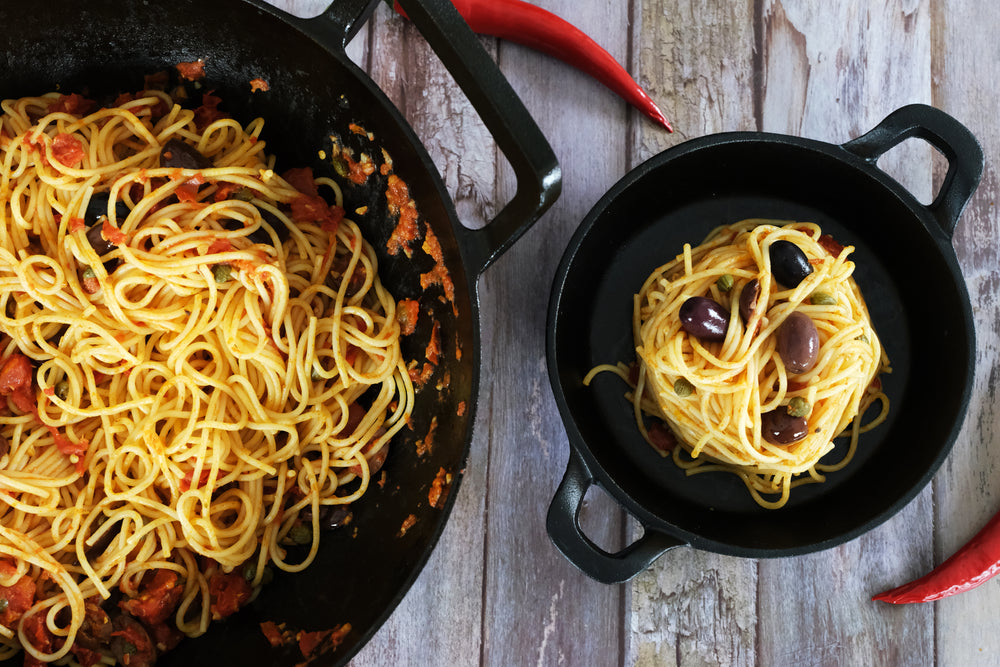Surdejsmestring: Sådan Perfektionerer Du Din Surdej med Støbejernsgryde

Introduktion: Surdejens genkomst
Surdejsbrød har oplevet en genopblussen i popularitet, hvor hjemmebagere overalt søger at mestre denne gamle kunst. Den syrlige smag, seje krumme og sprøde skorpe gør surdej til en favorit. Brug af cast iron cookware, såsom en Dutch oven, kan løfte din surdejsbagning til nye højder. Den overlegne varmebevarelse og jævne varmefordeling i cast iron hjælper med at skabe det perfekte bageklima for dit brød. I denne guide vil vi føre dig gennem processen med at bage det bedste surdejsbrød ved hjælp af Crucible Cookware cast iron produkter.
Hvorfor cast iron er ideelt til surdejsbagning
Cast iron cookware er kendt for sin evne til at bevare og fordele varmen jævnt, hvilket gør det ideelt til bagning af surdejsbrød. En cast iron Dutch oven skaber især et dampmiljø, der ligner en professionel brødovn. Denne damp er afgørende for at udvikle en sprød, gylden skorpe, samtidig med at brødet hæver smukt.

Kom godt i gang: Vigtige værktøjer og ingredienser
For at bage surdejsbrød skal du bruge nogle få essentielle værktøjer og ingredienser:
- Værktøj: Cast iron Dutch oven, dejskraber, køkkenvægt, røreskål, hævekurv, lame eller skarp kniv til ridser, og et viskestykke.
- Ingredienser: Brødmel, vand, salt og en surdejsstarter.

Trin-for-trin surdejsopskrift
Fremstilling af starteren
En sund surdejsstarter er hjertet i godt surdejsbrød. For at lave en starter, bland lige dele mel og vand i et glas, og lad det stå ved stuetemperatur. Giv starteren frisk mel og vand dagligt, indtil den bliver boblende og aktiv, typisk inden for 4-7 dage.
Æltning af dejen
Kombiner mel, vand og din surdejsstarter i en røreskål. Lad blandingen hvile (autolyse) i 30 minutter, og tilsæt derefter salt. Rør, indtil det er godt blandet.
Bulk fermentering
Lad dejen fermentere ved stuetemperatur, indtil den er fordoblet i størrelse. Dette tager normalt 3-4 timer, afhængigt af temperaturen i dit køkken. Udfør en række stræk og fold hver 30. minut i de første 2 timer for at udvikle gluten.
Formning af brødet
Vend dejen ud på en let melet overflade. Form den til et rundt eller ovalt brød ved at folde kanterne ind mod midten og vende det om. Brug en dejskraber til at hjælpe med formningen.
Hævning
Placer det formede brød i en hævekurv foret med et viskestykke. Lad det hæve ved stuetemperatur i 2-3 timer eller i køleskabet natten over for en længere, mere kompleks fermentering.
Bagning i støbejern
Forvarm din ovn til 475°F (245°C) med den støbejerns Dutch oven indeni. Overfør forsigtigt dejen til den varme Dutch oven, rids toppen med en lame eller en skarp kniv, og læg låget på. Bag i 20 minutter, fjern derefter låget og bag yderligere 20-25 minutter, indtil skorpen er dyb gyldenbrun.
Afkøling og opbevaring
Lad brødet køle helt af på en bagerist, før du skærer i det. Opbevar dit surdejsbrød i en papirpose eller indpakket i et viskestykke for at bevare skorpen.
Avancerede tips til perfekt surdej
- Hydreringsniveauer: Eksperimenter med forskellige hydreringsniveauer for at opnå den ønskede krummestruktur.
- Ridsningsteknikker: Vær kreativ med din ridsning for at skabe smukke mønstre på dit brød.
- Smagsvariationer: Tilsæt ingredienser som frø, urter eller tørret frugt for unikke smagsprofiler.
Fejlfinding af almindelige problemer
- Flade eller tætte brød: Sørg for, at din starter er aktiv og boblende, og undgå over- eller underhævning af dejen.
- Over- eller underhævning: Juster hævetider baseret på din køkkens temperatur.
- Forskellige klimaer: Tilpas din opskrift til forskellige klimaer ved at justere mængden af vand eller hævetider.

Konklusion: Nyd dit hjemmelavede surdejsbrød
Der er intet, der slår tilfredsstillelsen ved at skære i et hjemmelavet surdejsbrød. Server det med dine yndlingspålæg, kombiner det med fyldige supper, eller nyd det enkelt med smør. Del din surdejsrejse med Crucible Cookware-fællesskabet og fortsæt med at eksperimentere for at perfektionere dit håndværk.
















Efterlad en kommentar